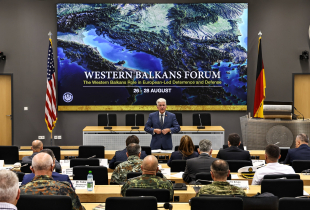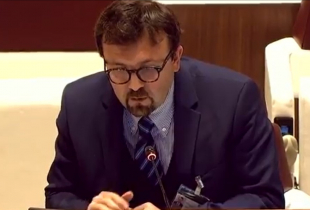
Democratic Backsliding and Security Governance
Executive Summary
This summary report presents key findings of the research conducted between April-November 2022 and highlights the challenges of security partners, provides a framework to strengthen the rule of law in partner nations by increasing awareness, and suggests protection mechanisms against various undemocratic practices. Such practices include illegal orders, direct or indirect influences of legal mechanisms, establishing personal loyalty that replaces loyalty to the rule of law, and infiltration of politics to criminal justice mechanisms.
The research draws the following conclusions and policy recommendations:
- Avoid “one size fits all” approach. It is imperative to explore the domestic contexts and causes of democratic backsliding to understand the interaction between politics and security governance.
- Understand the political tool box. It is necessary to understand the tools and mechanisms of undemocratic political practices that undermine the functioning institutions.
- Focus on the security institutions. Undemocratic tendencies use security organizations to consolidate power and establish personal loyalty, replacing loyalty to the rule of law and democratic principles.
- Beware of the risk posed by the lack of oversight of the security institutions. All case studies reveal that the intention is not to create more robust organizations able to redesign politics but rather to establish mechanisms to keep democratic practices alive.
- Reforms should be complementary to one another. Reform processes are used by the undemocratic political structures to consolidate their power. It is essential to establish mechanisms avoiding reforms that contribute to democratic backsliding.
- Protect Security Professionals. Increasing the awareness of security professionals to resist unlawful and illegal demands from the undemocratic political tendencies requires protection mechanisms. Meanwhile, developing and supporting different forms of networks (formal/informal) should act as a preventive measure against disengagement.
- Add new countries and external malign influence to the future phases of the project. The next step of the research should include more case studies and a new component that looks at the influence of external actors on the democratic backsliding.
About the Authors
Dr. Cüneyt Gürer is a professor of Transnational Security Studies at the George C. Marshall European Center for Security Studies. His research interests and areas of expertise comprise transnational security issues, regional security dynamics, human displacement, and non-state actors in the contemporary conflicts.
Agime Gashaj has worked as the Chief of Staff of the Minister of Defense in Kosovo since March 2021. She has a Master’s degree in security studies from Kansas State University, USA. She is a Fulbright Scholar, and interested in the Security Sector and Public Administration focusing on the methods to strengthen Kosovo institutions.
Dr. Elira Luli is a Professor/Lecturer at Luarasi University in Tirana. She teaches courses in the field of International Relations and Political Science. She has a PhD degree in International Relations and Political science from the European University of Tirana (2017). Her research interests are in Southeast European Studies, European Integration- Public Diplomacy; identity issues; interculturalism, and international security.
Dr. Aneta Manuilova is a capacity building, democratization, and security sector reform practitioner with academic interests in international relations and security. She has 25 years of professional experience in the Bulgarian Ministry of Interior (MoI), and 10 years of international police experience in UNMIK and in OSCE. She has a Ph.D. from the Academy at the MoI of Bulgaria with a focus on European organizational crime prevention models.
Rajko Radevic is a coordinator and expert on the project titled: Building Integrity in Defence and Security Areas in Montenego funded by the Kingdom of Norway. He holds a MA degree in International Security from the Faculty of Political Science - University of Begrade. He is currently a doctoral candidate at Faculty for Social Sciences at Ljubljana University.
The George C. Marshall European Center for Security Studies in Garmisch-Partenkirchen, Germany is a German-American partnership and trusted global network promoting common values and advancing collaborative geostrategic solutions. The Marshall Center’s mission to educate, engage, and empower security partners to collectively affect regional, transnational, and global challenges is achieved through programs designed to promote peaceful, whole of government approaches to address today’s most pressing security challenges. Since its creation in 1992, the Marshall Center’s alumni network has grown to include over 15,000 professionals from 157 countries. More information on the Marshall Center can be found online at www.marshallcenter.org.
The Clock Tower Security Series provides short summaries of Seminar Series hosted by the George C. Marshall European Center for Security Studies. These summaries capture key analytical points from the events and serve as a useful tool for policy makers, practitioners, and academics.
The articles in The Clock Tower Security Series reflect the views of the authors and are not necessarily the official policy of the United States, Germany, or any other governments.

